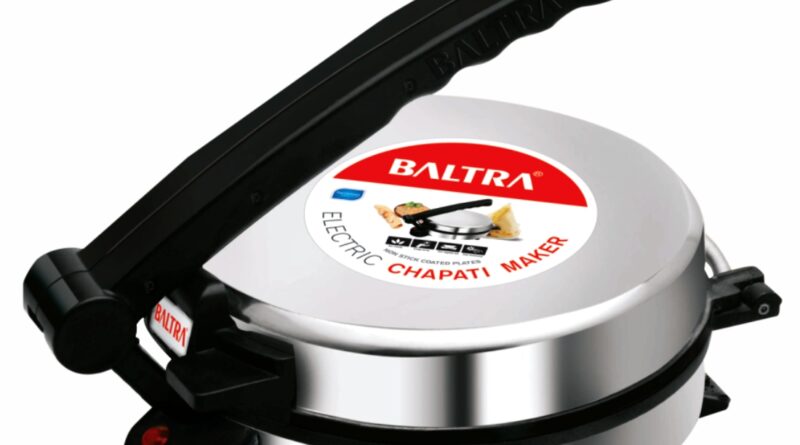Roti Maker: The Ultimate Kitchen Appliance for Effortless Roti Making
Making soft, fluffy, and perfectly round rotis is a time-consuming task. A roti maker is a game-changing kitchen appliance that simplifies this process, saving time, effort, and energy. Whether you’re a working professional, a homemaker, or a student living away from home, a roti maker can help you prepare delicious rotis effortlessly.
In this guide, we’ll explore the benefits, types, features, and tips for choosing the best roti maker for your kitchen.
What is a Roti Maker?
A roti maker is an electric or manual appliance designed to make perfectly round and evenly cooked rotis, chapatis, or tortillas with minimal effort. It consists of two non-stick plates, which press and heat the dough, cooking rotis in just a few seconds.
Why Should You Use a Roti Maker?
Here are some key advantages of using a roti maker in your daily kitchen routine:
✔️ Saves Time & Effort – No more rolling and manually cooking rotis.
✔️ Perfectly Round Rotis – Achieve uniform shape every time.
✔️ Consumes Less Oil – Healthier cooking with non-stick plates.
✔️ Energy Efficient – Uses minimal electricity and saves gas.
✔️ Ideal for Beginners – No need for expert rolling skills.
✔️ Mess-Free Cooking – No flour mess on kitchen countertops.
Types of Roti Makers
There are different types of roti makers available, depending on your preference and convenience:
🔹 1. Electric Roti Maker
✔️ Works on electricity and has automatic heating plates.
✔️ Ideal for quick and effortless roti making.
✔️ Comes with temperature control for better cooking.
🔹 2. Manual Roti Press
✔️ Simple hand-operated device for pressing dough into round shapes.
✔️ Requires separate cooking on a stove or tawa.
✔️ Budget-friendly and easy to use.
🔹 3. Fully Automatic Roti Maker (Atta Kneader + Cooking)
✔️ Kneads dough, rolls, and cooks rotis automatically.
✔️ Perfect for large families and busy individuals.
✔️ High-end models with advanced technology.
How to Choose the Best Roti Maker?
When selecting a roti maker, consider the following important factors:
✅ 1. Plate Material & Non-Stick Coating
✔️ Choose a non-stick coated surface for easy cleaning and less oil usage.
✔️ Aluminum or stainless steel plates ensure durability.
✅ 2. Power Consumption & Efficiency
✔️ Opt for a high-wattage roti maker (900-1200W) for faster cooking.
✔️ Ensure it has energy-saving features to reduce electricity costs.
✅ 3. Adjustable Temperature Control
✔️ Allows customization for roti thickness and softness.
✔️ Prevents overheating and burning.
✅ 4. Size & Weight
✔️ A lightweight and compact design ensures easy storage.
✔️ Large-size plates are better for bigger rotis.
✅ 5. Safety Features
✔️ Heat-resistant handles prevent burns.
✔️ Auto shut-off feature ensures safety and avoids overheating.
Step-by-Step Guide: How to Use a Roti Maker?
Follow these simple steps to make perfect rotis using a roti maker:
1️⃣ Prepare the Dough – Use soft, slightly sticky dough for best results. Avoid dry dough.
2️⃣ Preheat the Roti Maker – Switch it on and let it heat for 2-3 minutes.
3️⃣ Roll Dough Balls – Take a small dough ball and flatten it slightly.
4️⃣ Place & Press – Put the dough ball on the plate and press gently.
5️⃣ Cook & Flip – Let one side cook for a few seconds, then flip to the other side.
6️⃣ Puffing the Roti – Gently press the top lid to help the roti puff up.
7️⃣ Serve Hot – Remove the roti and serve fresh with butter or curry.
Best Roti Maker Brands in India
Here are some of the top roti maker brands known for quality and durability:
✔️ Bajaj – Reliable and energy-efficient roti makers.
✔️ Prestige – High-quality non-stick models with adjustable temperature.
✔️ Sunflame – Budget-friendly and easy-to-use designs.
✔️ Wonderchef – Stylish and durable roti makers for modern kitchens.
✔️ Jaipan – Compact and lightweight roti makers.
Tips for Perfect Rotis in a Roti Maker
👉 Use fresh, soft dough – Slightly wetter than usual chapati dough.
👉 Preheat properly – Always allow the roti maker to heat up before use.
👉 Apply light oil – This prevents sticking and improves texture.
👉 Do not over-press – Gently press to maintain softness.
👉 Experiment with settings – Adjust the temperature for best results.
Frequently Asked Questions (FAQs)
❓ 1. Can I make parathas and other breads in a roti maker?
✔️ Yes! Some models allow you to make parathas, khakras, and tortillas. However, stuffing-filled rotis may not work well.
❓ 2. Why do rotis turn hard in a roti maker?
✔️ Using dry or old dough can cause hard rotis. Ensure your dough is fresh and soft.
❓ 3. How do I clean a roti maker?
✔️ Wipe with a damp cloth after cooling down. Avoid scrubbing the non-stick surface.
❓ 4. Is a roti maker worth buying?
✔️ Absolutely! A roti maker saves time, effort, and makes cooking hassle-free, especially for busy individuals.
❓ 5. What is the price of a roti maker in India?
✔️ Roti makers start from ₹1,500 and go up to ₹5,000, depending on features and brand.
Conclusion
A roti maker is a must-have kitchen appliance for those who want quick, soft, and evenly cooked rotis without the hassle of rolling and flipping. Whether you need a manual, electric, or fully automatic roti maker, choosing the right one ensures efficiency, ease of use, and delicious results.
👉 Looking for the best roti maker? Explore our collection of top-rated, durable, and easy-to-use roti makers today!

